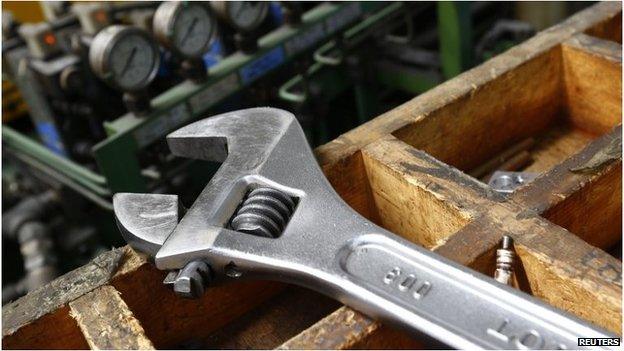Sterling slides as manufacturing slows
- Published

Sterling has fallen sharply against the US dollar after growth in the UK manufacturing sector slowed markedly in April.
Financial data company Markit said its monthly Purchasing Managers' Index (PMI), external for manufacturing fell to 51.9 in April from 54 in March.
Although a figure above 50 still indicates expansion, the fall was the biggest since February 2013.
The pound was down more than 2 cents, or 1.4%, to $1.5139.
Sterling also fell against the euro to €1.352.
Companies said the strength of the pound against the euro was affecting competitiveness in the eurozone.
The Markit survey follows the release of official figures on Tuesday that showed the UK's economic growth rate halved to 0.3% in the first quarter of the year.
Rob Dobson, senior economist at Markit, said: "Today's UK PMI delivered less-than-positive news on the health of the manufacturing sector.
"Any signs of rebalancing the economy towards manufacturing and exports remain frustratingly elusive."
Survey hits sterling
The survey found that new export orders fell at the fastest rate since January 2013, job creation was "modest", and manufacturers cut prices at their fastest rate in almost six years.
In recent months, the pound has gained in value against the euro. In March, it was at its highest level compared with the single currency in seven years, making UK goods more expensive in the eurozone.
At the same time, sterling has weakened against the dollar, and the survey said prices paid for goods priced in dollars had risen.
David Tinsley, an economist at UBS, said: "The source of the drop [in the PMI] may be an indicator that the appreciation of sterling against the euro is having an impact on UK manufacturing competitiveness.
"One would hope that as the upswing in the eurozone gains traction demand may begin to compensate for the currency move, but it's a reminder that monetary policy will need to be sensitive to the pound."
However, Lee Hopley, chief economist at EEF, the manufacturers' organisation, said: "It would be premature to write off manufacturing's contribution to growth in the future, not least because continued employment growth points to some confidence about longer-term prospects."
- Published1 May 2015
- Published28 April 2015
- Published29 April 2015